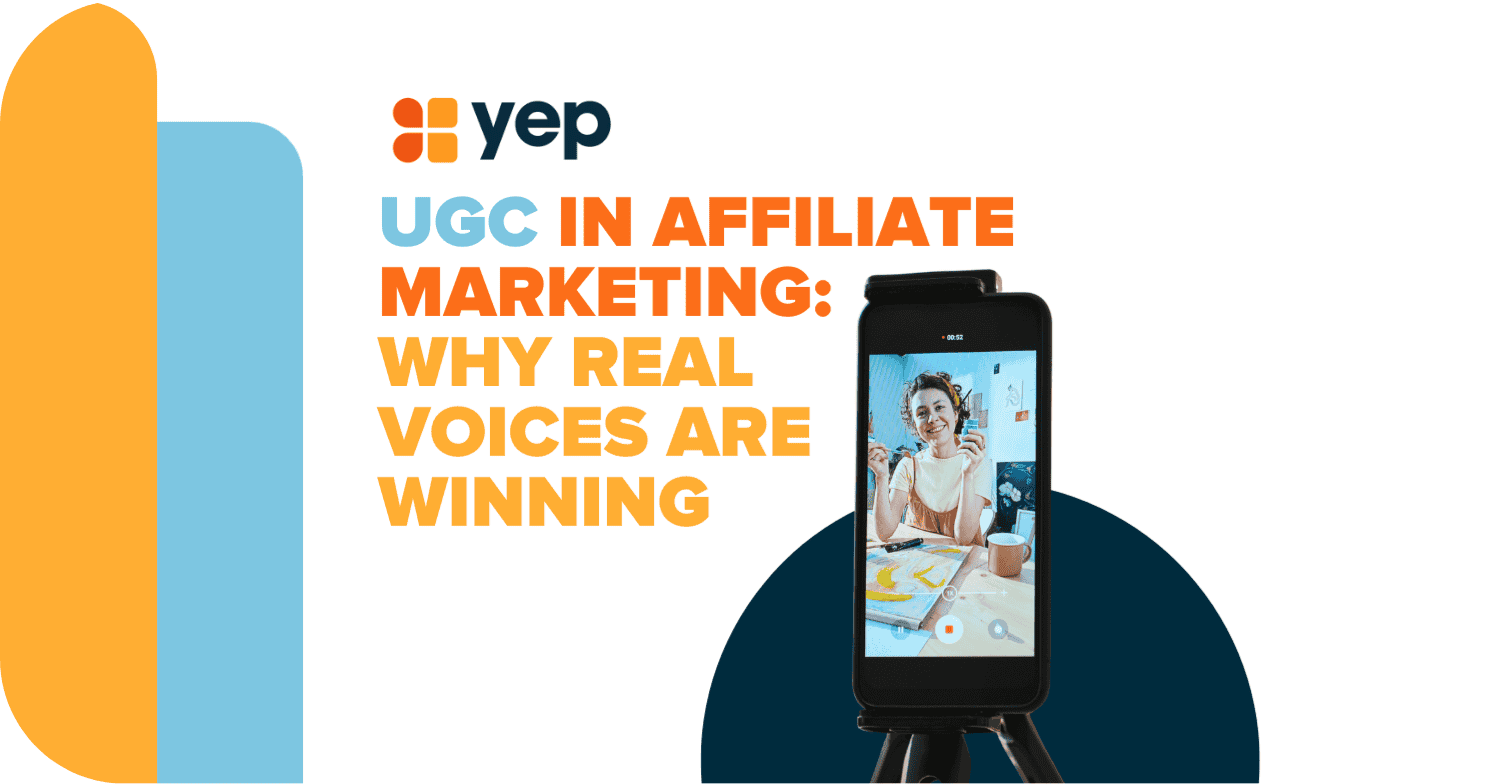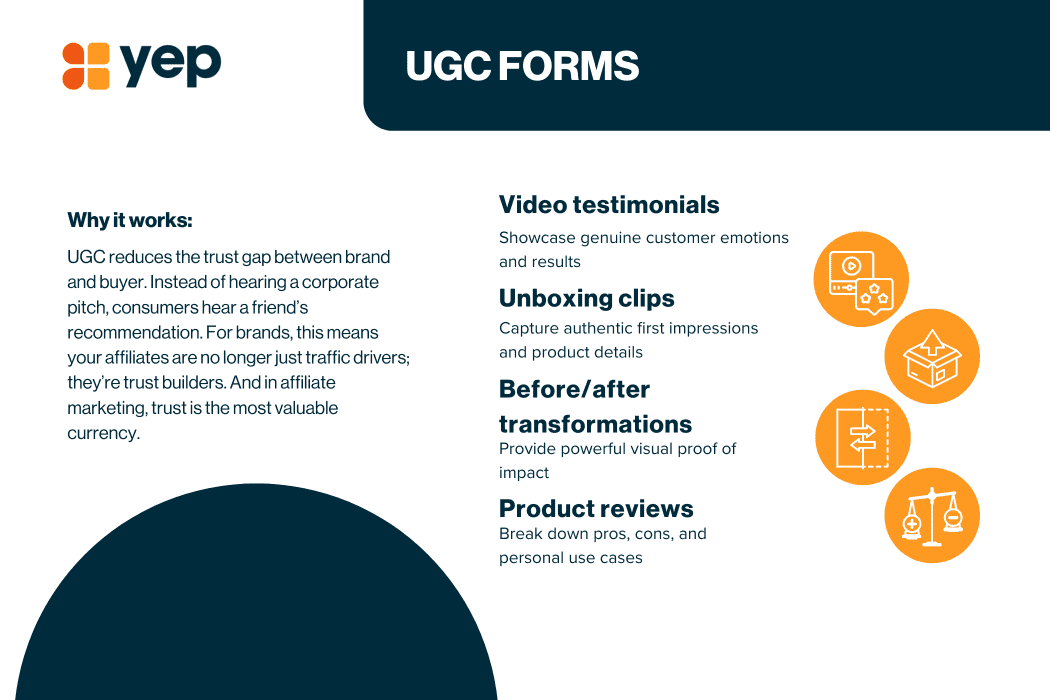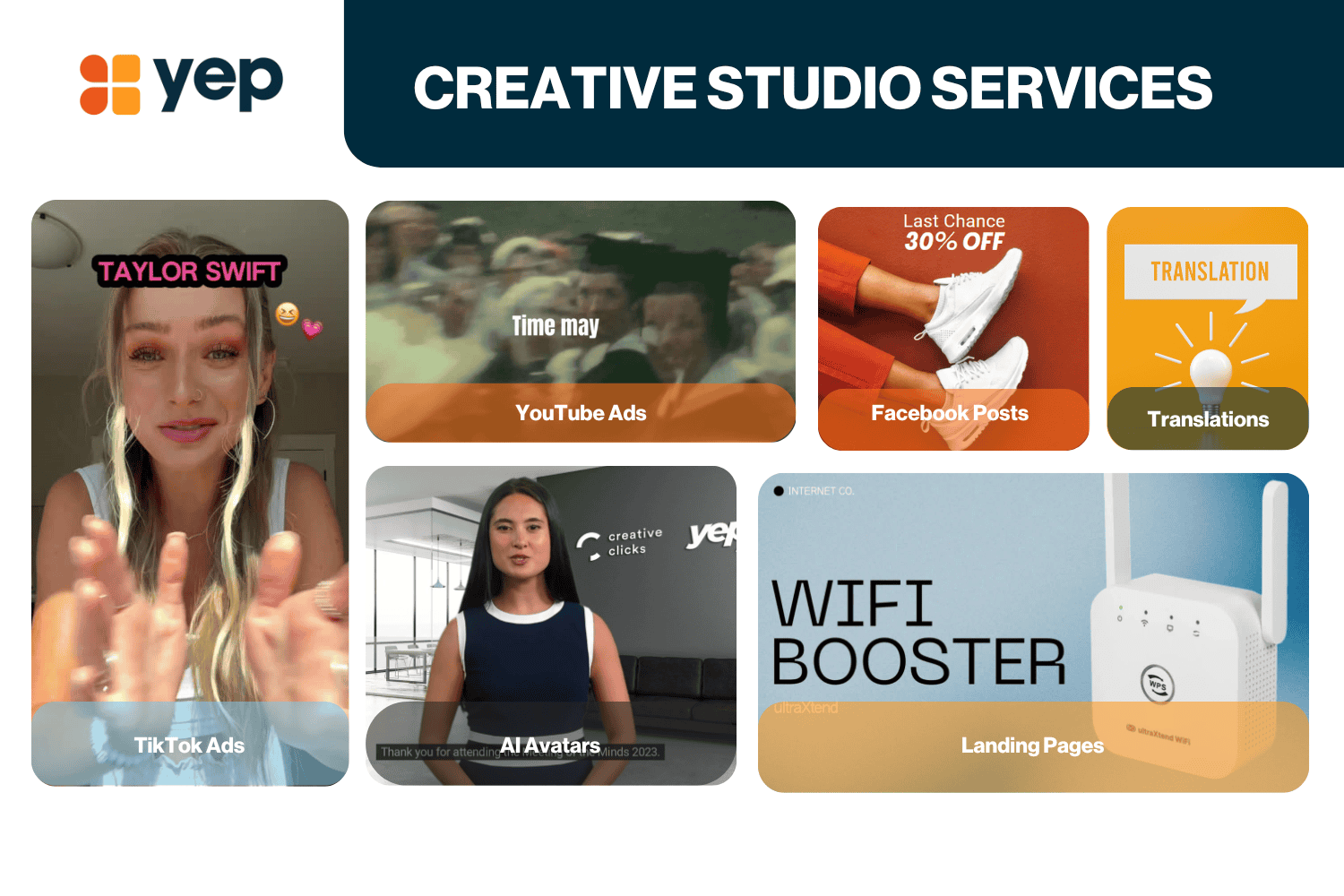
UGC in Affiliate Marketing: Why Real Voices Are Winning in 2026
In 2026, affiliate marketing powered by User‑Generated Content (UGC) isn’t just trending — it’s transforming how big brands acquire customers, retain loyalty, and expand into new markets.
Прошли те времена, когда преобладали идеально срежиссированные студийные съемки. Сегодняшние покупатели хотят подлинности, достоверности и доказательств того, что ваш продукт нравится реальным людям, а не платным актерам. Вот тут-то и приходит на помощь пользовательский контент.
Бренды - от миллиардных гигантов электронной коммерции до глобальных лидеров SaaS - смещают рекламные расходы в сторону аутентичного контента, создаваемого авторами, и объединяют его с высокоэффективными партнерскими каналами. И когда эти две силы объединяются, получается быстрый рост результатов.
Оглавление
- Что такое пользовательский контент и почему он работает для крупных брендов
- Why UGC Is Booming in 2026
- Как пользовательский контент приносит пользу даже самым крупным брендам
- Пользовательский контент + партнерский маркетинг = масштабируемый механизм доверия
- Роль экспериментов с источниками трафика
- Почему Yep Ads рекомендует партнерские кампании, основанные на пользовательском контенте
- Как пользовательский контент повышает SEO и конверсию партнеров
- Вопросы и ответы о пользовательском контенте и партнерском маркетинге
Основные выводы
- User-generated content is dominating affiliate marketing in 2026 because buyers crave authenticity, relatability, and proof from real people.
- Крупные бренды, такие как Coca-Cola, ASOS, GoPro, and Airbnb используют пользовательский контент для укрепления доверия, расширения охвата и повышения конверсии на глобальных рынках.
- Сочетание пользовательского контента с партнерским маркетингом создает масштабируемый механизм доверия, в котором партнеры становятся одновременно и движущей силой трафика, и фактором доверия.
- Тестирование пользовательского контента в различных источниках трафика, от TikTok и YouTube Shorts до SEO-блогов и электронной почты, позволяет выявить наиболее эффективные каналы для каждой кампании.
Что такое пользовательский контент и почему он работает для крупных брендов
По своей сути пользовательский контент - это любой контент, созданный реальными пользователями, клиентами, авторами, партнерами - не вашей внутренней командой маркетологов. Он бывает разных видов:
- Видеосвидетельства → Демонстрируйте подлинные эмоции и результаты клиентов.
- Клипы для распаковки → Запечатлейте подлинные первые впечатления и детали продукта.
- Преобразования до и после → Обеспечьте мощное визуальное доказательство воздействия.
- Отзывы о товаре → Разберите плюсы, минусы и личные случаи использования.
- Посты в социальных сетях → Покажите, как ваш продукт вписывается в повседневную жизнь.
Почему это работает: Пользовательский контент сокращает разрыв в доверии между брендом и покупателем. Вместо того чтобы слушать корпоративную рекламу, потребители слышат рекомендацию друга. Для брендов это означает, что ваши аффилированные лица больше не являются просто драйверами трафика; они создают доверие. А в партнерском маркетинге доверие - самая ценная валюта.
Это работает, потому что это подлинный и достоверный.

Источник изображения: Yep Ads Веб-сайт
Данные говорят сами за себя:
- 79% потребителей говорят, что пользовательский контент оказывает большое влияние на их решения о покупке.
- Пользовательский контент может поднять коэффициент конверсии на ~28% и даже больше по сравнению с традиционным брендовым контентом.
- Это 85% более эффективен при преобразовании по сравнению с отшлифованной студийной рекламой, потому что в ней чувствуется человечность и несценарий.
Why UGC Is Booming in 2026
- Кризис доверия к традиционной рекламе: 92% людей доверяют рекомендациям сверстников, а не брендированным сообщениям. Пользовательский контент обеспечивает такое доверие.
- Захват короткого видео: TikTok, Reels и Shorts сделали непринужденные, аутентичные видео форматом контента по умолчанию.
- Предпочтение алгоритма: Социальные алгоритмы повышают вовлеченность контента, а не только расходы на рекламу. Пользовательский контент часто лучше органического.
- Эффективность затрат: Пользовательский контент создается быстрее и дешевле, чем традиционные кампании, что позволяет брендам и аффилированным лицам тестировать больше идей.
- Эра конфиденциальности: В условиях ограничений на отслеживание рекламы брендам нужен контент, который работает органически и по нескольким каналам.
Как пользовательский контент приносит пользу даже самым крупным брендам
Пользовательский контент нужен не только маленьким авторам: такие компании с миллиардными оборотами, как AmazonUber, Airbnb и другие компании, которые используют эту технологию:
- Coca-Cola - #ShareACoke: На протяжении многих лет Coca-Cola предлагала потребителям найти бутылки с именами или душевными посланиями и поделиться фотографиями, используя хэштег #ShareACoke. Эта простая и глубоко личная механика собрала миллионы сообщений по всему миру. Кампания превратила покупателей в послов бренда, повысив узнаваемость, эмоциональную связь и продажи в одном глобальном цикле.
- ASOS - #AsSeenOnMe: Компания ASOS превратила своих покупателей в моделей, предложив им публиковать фотографии нарядов с помощью сервиса #AsSeenOnMe. Эти снимки попадают в социальные сети, на сайты электронной коммерции и даже в галереи товаров и рекламу. Это очеловечивает бренд и показывает более широкий спектр стилей и типов фигуры в реальной жизни.
- GoPro - GoPro Awards: Компания GoPro проводит постоянную программу GoPro Awards, в рамках которой предлагает пользователям присылать свои лучшие фотографии и видео, снятые на камеры GoPro. Отобранные работы демонстрируются на YouTube, в социальных каналах и платных кампаниях, превращая экстремальные приключенческие кадры, снятые пользователями, в основу контента для бренда.
- Airbnb - #AirbnbExperiences: Airbnb поощряет гостей и хозяев размещать реальные фотографии и видео о пребывании и местных историях в разделе #AirbnbExperiences. Пользовательский контент регулярно появляется в социальных сетях, рассылках и на сайте Airbnb, привнося аутентичные рассказы о путешествиях в путешествие каждого клиента.
Even massive brands know: in 2026, people trust people, not logos.
Пользовательский контент + партнерский маркетинг = масштабируемый механизм доверия
Партнерский маркетинг уже работает на доверии: аудитория следует за партнерами, потому что доверяет их рекомендациям. Когда аффилиаты используют пользовательский контент:
- CTR увеличивается потому что контент кажется личным, а не рекламным.
- Повышение вовлеченности зрители относятся к реальному опыту.
- Повышение конверсии потому что доверие устанавливается до щелчка.
Преимущество "Yep Ads": Наша собственная творческая студия может создавать безопасный для бренда, высококонверсионный пользовательский контент по запросу, оптимизированный для каналов, на которых уже доминируют ваши партнеры.

Источник изображения: Yep Ads Веб-сайт
Роль экспериментов с источниками трафика
Одна из самых больших ошибок партнеров - придерживаться одного источника трафика.
Один и тот же пользовательский контент может иметь разную эффективность в зависимости от того, где его показывают. Выигрышная формула заключается в следующем тест → мера → шкала.
Источники трафика, с которыми можно экспериментировать:
- Социальные объявления: TikTok, Instagram, YouTube Shorts, Facebook.
- SEO: Соедините пользовательский контент с обзоры блогов и сравнения продуктов.
- Нативная реклама
- Маркетинг по электронной почте: Добавляйте пользовательский контент в информационные бюллетени для укрепления доверия.
- Сообщества: Reddit, Discord, niche Facebook groups.
Совет профессионала: Отслеживайте CTR, EPC и конверсии по источникам трафика. Затем направьте бюджет на каналы с наилучшим ROI.
Почему Yep Ads рекомендует партнерские кампании, основанные на пользовательском контенте
Пользовательский контент - это не просто креативный наполнитель, это мультипликатор конверсии. В Yep Ads мы убедились, что он приносит исключительные результаты как быстрорастущим стартапам, так и самым известным мировым брендам.
- Повышение конверсии благодаря контенту, ориентированному на доверие
Крупные бренды известны, но пользовательский контент повышает доверие к ним. Реальные истории, отзывы и демонстрации продуктов от реальных пользователей выглядят как рекомендации, а не как реклама, что повышает количество кликов и конверсию.
- SEO-дружественный контент с долгосрочной ценностью
Отзывы клиентов, вопросы и ответы, а также подлинные визуальные материалы добавляют на страницы бренда свежий контент, богатый ключевыми словами. Это повышает рейтинг и продолжает привлекать трафик еще долгое время после завершения кампании.
- Масштабируемость и быстрая оптимизация
Наша собственная креативная студия и партнерское агентство могут создавать, тестировать и масштабировать сотни вариантов пользовательского контента в течение нескольких недель, обеспечивая крупным брендам гибкость при запуске или корректировке кампаний.
- Работает в любой вертикали
От финансов до путешествий, от SaaS до электронной коммерции - пользовательский контент может быть адаптирован к любому рынку. Yep Ads связывает бренды с авторами, которые уже влияют на их нишу, обеспечивая максимальное воздействие.
Заключительное слово
UGC makes affiliate marketing feel human, and that’s why it’s dominating in 2026. Combine authentic content with a smart traffic testing strategy, and you can create campaigns that are not just engaging but consistently profitable.
If you’re ready to scale affiliate campaigns with UGC, Yep Ads can connect you to high-performing offers, creators, and tools to make it happen.
Как пользовательский контент повышает SEO и конверсию партнеров
Пользовательский контент - это не только доверие и подлинность, но и SEO-мощная сила. Каждый отзыв, фотография или видеоролик клиента добавляет свежий, богатый ключевыми словами и естественный разнообразный контент на страницы вашего продукта или кампании. Поисковым системам это нравится, поскольку это свидетельствует о реальной вовлеченности, позволяет обновлять страницы и удовлетворять длинные запросы, до которых ваша штатная команда может и не додуматься.
Вопросы и ответы о пользовательском контенте и партнерском маркетинге
- Что делает пользовательский контент более эффективным, чем традиционный брендовый контент в партнерском маркетинге?
Пользовательский контент кажется аутентичным и легко узнаваемым, потому что он создан реальными клиентами или авторами, а не самим брендом. Это быстрее вызывает доверие, что очень важно в партнерском маркетинге, где конверсия часто зависит от личных рекомендаций. - Могут ли крупные бренды получить реальную выгоду от пользовательского контента, или это только для малого бизнеса?
Absolutely. Major brands like Coca‑Cola, ASOS, GoPro, and Airbnb use UGC to humanize their campaigns, expand reach, and boost conversions. In 2026, even the biggest companies are leaning on UGC to maintain trust and relevance. - Как пользовательский контент улучшает SEO для партнерских кампаний?
Пользовательский контент добавляет на ваши страницы свежий, богатый ключевыми словами и аутентичный контент, помогая им ранжироваться по большему числу поисковых запросов. Отзывы, вопросы и ответы, фотографии клиентов также повышают E-E-A-T сигналы, улучшают вовлеченность и поддерживают страницы в актуальном состоянии для поисковых систем. - Какие источники трафика лучше всего подходят для партнерских кампаний, основанных на пользовательском контенте?
Не существует какого-то одного "лучшего" источника; результаты зависят от ниши и аудитории. Тестирование - ключевой момент. Лучшие каналы, которые стоит попробовать: TikTok, ролики Instagram, шорты YouTube, нативная реклама, SEO-контент в блогах и маркетинг по электронной почте со встроенным пользовательским контентом. - Как Yep Ads может помочь брендам в проведении успешных партнерских кампаний пользовательского контента?
Yep Ads соединяет бренды с проверенными создателями и аффилиатами, производит безопасный для бренда пользовательский контент собственными силами и проводит тесты трафика на основе данных. Это гарантирует, что ваши кампании будут оптимизированы для максимального CTR, EPC и долгосрочного ROI.
Вам также может понравиться:
- Retail Affiliate Programs in 2026: What Brands Need to Know
- What Is Affiliate Marketing? A 2026 Full Guide
- Как сделать партнерский сайт
